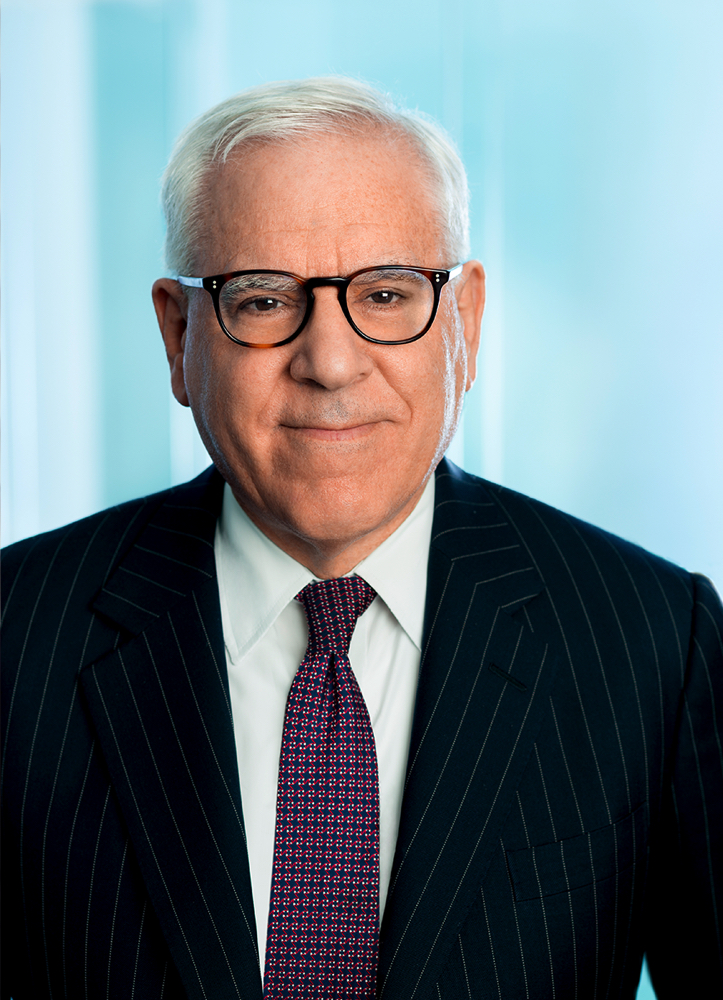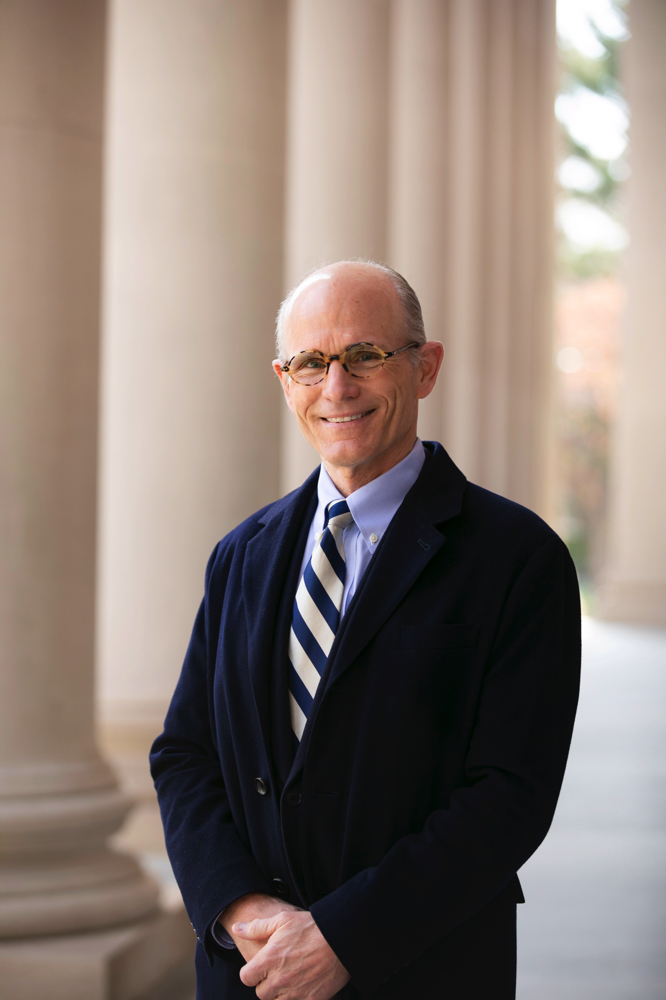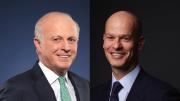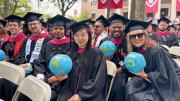The University announced today that Timothy R. Barakett ’87, M.B.A. ’93 , who founded and ran a large hedge fund, will succeed fellow Corporation member Paul J. Finnegan ’75, M.B.A. ’82, a private-equity investor, as Harvard’s treasurer July 1. This planned change inaugurates a major transition in Harvard’s senior financial personnel; their record and the context for the changes are discussed below. Finnegan remains a Corporation member, and a member of the board of directors of Harvard Management Company (where the treasurer serves as chair—a role Finnegan will continue to perform until his Corporation service ends). Along with the University’s president, the treasurer is an ex officio member of the Board of Overseers.
In a joint statement, President Lawrence S. Bacow, President-elect Claudine Gay, and Corporation senior fellow Penny Pritzker cited Barakett as “among Harvard’s most dedicated alumni, with close ties across the schools and with a particularly strong interest in assuring educational opportunities at Harvard for students from low- and middle-income families.” The announcement noted that the Barakett family’s largest gift to Harvard, for financial aid, helped launch start-up grants for first-year undergraduates from low-income families. The three leaders saluted Finnegan for having “served Harvard with extraordinary commitment and effectiveness, including his role in helping the University navigate the financial challenges posed by the COVID-19 pandemic.”

David M. Rubenstein
Photograph courtesy of Harvard Publlic Affairs and Communications
Separately, the University announced that David M. Rubenstein, a private-equity executive who joined the Corporation in July 2017, will conclude his service June 30, rather than continuing for a second six-year term. This is not unprecedented: James W. Breyer, M.B.A. ’87, served for just six years, ending his term in 2019. Rubenstein co-chaired the Harvard Campaign and has himself made notable gifts to the Kennedy School and, more recently, the planned University conference center (see “Theater and ‘Treehouse’ in Allston,” March-April, page 18). He chaired Duke’s board of trustees from 2013 to 2017, and now performs the same duties at the University of Chicago (his undergraduate and law school alma maters, respectively). A successor has not been named. Thus, as Gay joins the governing board succeeding the retiring Bacow, she will have some voice in shaping its membership early in her administration.
Bacow said in the announcement, “One of the best things board members can do is ask probing questions about difficult issues in constructive ways, and David Rubenstein is a master of that craft. It’s been a privilege serving with him on the Corporation, and both his wisdom and his wit have greatly enhanced our deliberations. I’m deeply grateful for his service, his counsel, and his generous support not just of Harvard but of universities and cultural institutions nationwide.”
Financial Strength…
Among the legacies Bacow bequeaths to Gay is across-the-board financial strength. Among the challenges Gay faces is significant turnover among the people responsible for that robust fiscal position, resulting in the need to restaff Harvard’s financial leadership. The principals involved include the vice president for finance, the University treasurer, and a significant share of the board of directors of Harvard Management Company (HMC), which oversees investment of the endowment).
The financial indicators are uniformly good: an endowment most recently valued at more than $50 billion; continuing surpluses, culminating in $406 million of black ink during fiscal year 2022; well-timed reductions in the interest costs on Harvard’s $6 billion in debt outstanding; and a reasonably restrained capital-spending program. (See details in this report on the results for the fiscal year ended June 30, 2022.)
…as the Team Turns Over

Thomas J. Hollister
Photograph by Stephanie Mitchell/Harvard Public Affairs and Communications
The CFO. The retirement of Thomas J. Hollister, vice president for finance and chief financial officer since 2015, has been reported previously; it takes effect June 30 as Bacow’s presidency ends. Hollister oversaw a comprehensive restructuring of Harvard’s borrowings, taking advantage of the period of low interest rates that ended in early 2022 to substantially reduce debt-service costs—a benefit that will extend for decades, saving the institution hundreds of millions of dollars. At the end of the past decade, he and his colleagues planned in advance for a future recession—and so prepared the entire University before the nascent pandemic shuttered the campus in March 2020 and raised the prospect of staggering losses. In the event, the expense disciplines quickly put into place; timely borrowing of reserve funds in case of need (at extremely favorable interest rates); and the effects of pivoting to online instruction and safely restarting research while campus-based teaching, residence costs, and travel were curtailed collectively yielded increasingly large surpluses. The accumulated operating surpluses of more than $900 million during the three pandemic years (including those reported above) represent a significant reserve for deans to invest in future academic initiatives—or an equally large cushion should national and global economic conditions deteriorate unexpectedly.
Harvard Management Company. On the basis of Hollister’s record alone, finding the right successor looms large. But that transition has other implications, too. The vice president for finance/CFO customarily is a member of the HMC board of directors, which currently includes HMC chief executive N.P. Narvekar and 14 others. Among the latter are Bacow and Hollister; both will rotate off, presumably to be succeeded by Gay and the University’s new CFO. They provide ultimate oversight of HMC’s management of the endowment—distributions from which are by far the largest source of Harvard’s annual operating revenues: $2.1 billion of the total $5.8 billion in fiscal year 2022. The board’s ranks were augmented in March, when it was announced that Tricia Glynn, managing partner of Advent International (a Boston-based private-equity firm), and Keith Johnson, CEO of Sequoia Heritage (a private investment fund), had been elected directors.
The Treasurer. The other central figure in Harvard’s financial leadership is the University treasurer, a member of the Corporation. Most community members will know the incumbent, Finnegan, principally through his letter in the University’s annual financial report, written jointly with Hollister. A Chicago-based private-equity executive who had served as president of the Harvard Alumni Association and a member of the Board of Overseers, he was elected to the Corporation in 2012. He thus arrived just after the 2010 governance reforms, which were aimed in part at enhancing oversight of Harvard’s fiscal affairs in the wake of severe endowment and other losses during the financial crisis and ensuing Great Recession at the end of the previous decade. Finnegan helped plan and lead the Harvard Campaign, which did much to repair the University’s finances after those earlier losses.
In 2014, he was elected treasurer, succeeding James F. Rothenberg ’68, M.B.A. ’70. The treasurer has often been someone professionally steeped in finance, given the Corporation’s fiduciary role. Under the Corporation’s 2010 governance procedures, Rothenberg was scheduled to conclude his service in 2016, making for a timely transition and continuity in the treasurer’s role; that precaution became tragically timely in July 2015, when Rothenberg died of a heart attack.
Finnegan was thus in place as treasurer when Hollister was appointed vice president, and was deeply involved in the appointment of Narvekar in 2016 to run HMC—initiating a wholesale remaking of its organization, personnel, and strategies aimed at strengthening its investment performance. (During this team’s joint tenure, the Corporation made the decision to moderate distributions from the endowment during the transition to and first years of the Bacow administration and the remaking of HMC. That decision seemed prudent in light of past experience: it cushioned the balance sheet, and it made possible the more complete recovery of the endowment given the extraordinary endowment returns during fiscal 2021. As a result, for the first time since the financial crisis more than a decade ago, the endowment has essentially regained its inflation-adjusted purchasing power of 2007-2008.)
Under those same governance and succession procedures, of course, Finnegan will be scheduled to complete his dozen years of Corporation service in 2024. In light of that departure, it appears that another smooth transition was planned. Barakett was elected a Corporation member in 2019. He joined the HMC board last July. Thus the logical result of the planned transition will be a newish HMC director, joined by four genuinely new board members (Gay as president, Hollister’s successor as financial vice president and CFO, plus Glynn and Johnson); and refreshed University financial leadership, with the vice president/CFO presumably in place, Narvekar continuing at the endowment’s helm, and Barakett assuming the treasurer’s reins before Finnegan steps down from his Corporation role.
Harvard’s finances in the presidential transition. Looking ahead, the planned rate of distributions has now been increased (from about 2.5 percent per unit annually to 4.5 percent), guided by a formula that smooths out volatile market returns (the outsized gains during fiscal 2021, followed by modest losses the next year). That both bolsters deans’ options and keeps some powder dry, come what may, as Gay assumes office this July 1.
In terms of endowment management, the University and HMC (Finnegan, Hollister, and Narvekar, among others) have negotiated a joint understanding about Harvard’s tolerance for investment risk, and therefore the endowment managers’ appropriate strategy for those financial assets (discussed here). In a sense, that represents the outcome of a decade and more of recovery from the Great Recession—and of Corporation-level governance reforms, strengthening of the University’s financial management and controls, and the transformation of HMC.
With the systems and disciplines put in place during Finnegan and Hollister’s tenure (plus plenty of help from the capital campaign and a favorable economy), the successor CFO and treasurer ought to begin their work confident about the University’s financial strength—and the academic strengths thereby made possible—for the foreseeable future. As Claudine Gay assumes the presidency and its many new responsibilities, University finances might reasonably be considered one where Harvard’s house is in good order.
Read the University treasurer announcement here and the announcement about David Rubenstein and the Corporation here.









